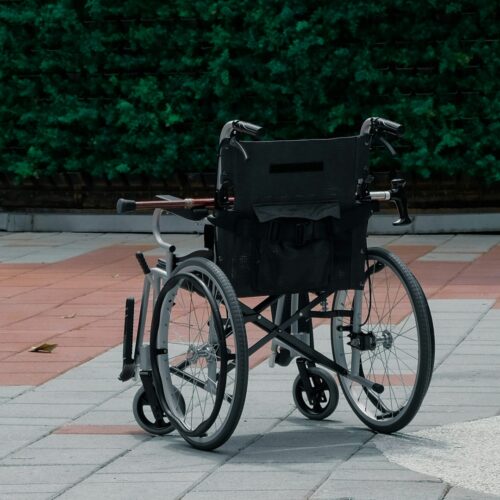For so many people with spinal cord injuries (SCI), chronic pain becomes a daily struggle that can begin to affect not only physical comfort but also emotional well-being, and ultimately their overall quality of life.
While medication remains a lifeline for SCI-affected people, there are some additional options for treatments that stretch beyond pharmaceutical care.
In this article, we’ll discuss other practical and alternative strategies for managing spinal cord injury nerve pain, explore a more holistic approach that will empower individuals with SCI, as well as any adjustments that they can implement into their day-to-day lives.
We’ll also share how you can access rehabilitation packages with Aspire Law and why they’re invaluable for recovery and regaining your independence.
Understanding chronic pain after spinal cord injury
Chronic pain after a spinal cord injury is one of the most life-changing aspects of the injury. It can affect everything from your rehabilitation and your return to work to social interactions with friends and family, and even how you sleep.
This pain can be split into the following categories:
- Neuropathic pain: Pain can be felt in areas of the body that otherwise have little or no feeling as a result of damage to the nerve endings. This pain typically evokes the feeling of burning, stabbing, shooting or tingling.
- Musculoskeletal pain: Due to damage to the bones, joints or tendons, this type of pain is worsened by movement; rest is typically prescribed as the treatment.
- Visceral pain: This type of pain is caused by gastrointestinal complications, like ulcers, appendicitis and constipation. Changes in diet are normally the best form of pain relief.
The causes of chronic pain after an SCI are often mysterious and complex. The body often reacts in a way that we don’t yet fully understand, like neuropathic pain. Additionally, pain can be caused by pressure sores, infections and other secondary complications, like arthritis.
Although there is currently no cure for spinal cord injury-related pain, understanding and effectively managing this pain can significantly improve an individual’s quality of life and help them function better in their daily lives.
Limitations of medication-only approaches
Modern healthcare is truly a marvel. Medication and other prescribed treatments are a lifeline for so many people with spinal cord injuries, and do wonders for assisting with pain management.
Of course, it’s important for us to acknowledge that many of these medications come with side effects and can sometimes not be enough to fully address the physical and psychological aspects of pain.
Adopting a more holistic approach can be more effective for tackling pain in all of its forms. Different types of physical therapies, massages and sessions for your mental health can enhance the effectiveness of your medication, making you as comfortable as you possibly can be, whilst improving your overall well-being and attempting to reduce the over-reliance on often addictive pain killers.
Alternative pain management strategies
Physical therapy & exercise
For musculoskeletal pain, tailored physiotherapy programs can play a crucial role in managing pain for people with SCI. Movement that is guided by professionals can help to reduce stiffness, prevent secondary pain caused by immobility and improve circulation.
These exercises can also strengthen muscles that support the spine, enhancing posture and increasing physical function over time.
Mind-body techniques
The mind plays a powerful role in overcoming pain and adversity. Psychological treatments, such as mind and body techniques, are effective alternative strategies for musculoskeletal and nerve pain.
Find whatever works best for you. It could be anything from meditation and mindfulness to guided imagery and breathing exercises, all of which help to activate the body’s natural relaxation response.
We understand that the rehabilitation and recovery process can be an incredibly stressful time, especially when you’re in pain and are struggling to see the light at the end of the tunnel. These practices are great for lowering stress levels, reducing muscle tension, and altering pain-processing pathways in the brain, and can offer valuable relief for nerve pain.
Acupuncture and massage
Acupuncture is one of the most established therapies for those experiencing chronic pain. It’s an incredibly popular complementary therapy and has been used across many clinics for pain management. It works by activating the body’s pain control system or by interrupting the flow of pain.
Furthermore, therapeutic massages are an effective way to target nerve sensitivity and tension in the muscles. It can even encourage improved emotional well-being. We recommend that you conduct some research before you go to ensure that the physical therapists can cater to your specific needs, but these are definitely methods worth giving a go.
Lifestyle adjustments and daily tips
Additionally, there are some small but mighty ways you can make a difference in managing spinal cord injury nerve pain. These changes include the following:
- Posture: Using supportive cushions, try to maintain your posture. This can help to reduce pressure and discomfort.
- Hygiene: Prioritise sleep hygiene, which can improve your quality of rest, as well as your pain tolerance.
- Managing stress: through relaxation techniques, staying hydrated and other methods, you can effectively manage your stress levels and support your overall health.
- Monitor your diet: As we’ve mentioned above, visceral pain can be managed effectively by following an anti-inflammatory diet.
- Adaptive devices: These are invaluable for reducing strain on vulnerable areas and promoting a stronger sense of independence.
Building a personalised pain management plan
Collaborate with your healthcare provider on a personalised pain management plan. Pain management can span a range of medical professionals, including physiotherapists, pain specialists, psychologists, and occupational therapists.
We recommend keeping a journal that monitors your pain, tracking any patterns, particular triggers and responses to your treatment. This can inform any changes that need to be made and ensure that your pain is managed as much as possible.
Receiving support with Aspire Law
Integrating a combination of methods tailored to individual needs often provides the best results, empowering patients to take an active role in their recovery journey.
At Aspire Law, we are committed to supporting individuals with SCI through every step of their recovery. We support you with rehabilitation packages, interim payments and other financial methods that enhance your recovery and pain management.
Also, our partner charity, Aspire, is here to help across all aspects of your injury, including access to adaptive devices, housing needs and empowering independent living.
For more details about how you or a loved one can get the help you deserve, please get in touch with us today.



